The huge crowds that were marching on Sunday 9 June 2019 in Hong Kong to protest the extradition bill understood it was time to push back Beijing. Under the extradition bill, people could be extradited to China and face judgment or prison terms in what can hardly be deemed a place where due process rules.

The resentment has been simmering for months now, as the executive, now strong with a majority at the LegCo, purport to ram the bill through on Wednesday. While the democratic party and others, such as the Wong’s would-be “party”, Demosisto, tried to incite protests, this is largely a feeling of the people, down to the grassroots.
Many families came with their children, and the crowd was mixed between youngsters and more aged people, representing a huge cross-section of the population.
Asking for trouble

I spotted a few potential troublemakers who took great efforts to conceal their identity via masks, sunglasses and generic hats. Nevertheless, the huge majority of the population was calm but determined. It got a bit warmed up however, when the police tried to keep traffic flowing despite the sheer number of protesters.

One million?
I cannot tell for sure whether there was one million people in the streets, but there sure were a lot of people marching.

The police put the protesters figure first at 130,000, then progressively had to revise to 240,000 then 270,000… Which is telling enough. I guess we can confidently assess the number of people to be superior to 500,000.

A lot of Taiwanese flags could be observed, as though Hongkongese took comfort in the knowledge that a neighboring island had the courage of being independent and preserving its democracy and identity.
Obstination
Despite the huge crowds, Carrie Lam confirmed on Monday 10 June, that she would go ahead with the bill. The pro-government block in the Legislative Council has enough votes for the bill to pass as it is.
The Government did try to allay the businesses’ concerns about being extradited to China on any transit through Hong Kong, by revising upward the crimes which would allow for extradition. But to be honest, this concern is not really warranted as Hong Kong immigration has been recently refusing entry to several high-profile foreign citizens or exiles who displeased China. China does already exercise a huge control over the city, and businesses invested in Hong Kong should become aware sooner rather than later.
In 2003, the HK government pulled back from enacting a law on national security after another massive protest. Today, faced with even higher numbers, Carrie Lam stood her course. What changed? The knowledge that democracy and accountability is not the future of Hong Kong as China has chartered it. No, in a few years, even Communist party membership will become obligatory to find a job here.
Youth violence
The anger and irritation at China expressed itself finally through riots with very young protesters determined to make a show of force at the LegCo, as they tried to do in November 2017 for the last time. Police responded measuredly (although in Hong Kong, using pepper spray is considered “very violent”, which is quite different from Europe), but the fact is there: the younger people of Hong Kong are fed up with being Sinicized against their desire. This was a warning shot across the bow. China should beware about not allienating even more the people they are trying to coerce/seduce into becoming part of the mainland.

The anti-extradition protests in Hong Kong 
The Crowd marching on 
A protester takes a pic of the marchers on her smartphone. 
Drummers march by in the protest 
This placard summarizes the general feeling of the population… 
Another smartphone pic of the crowd at Admiralty
In terms of realpolitiek, what can the youth of Hong Kong achieve? Not much, I am afraid. China would not shy away from creating another Tienanmen massacre if it needs to. The only result would be to finally open the eyes of the West on who their “partner” really is.







